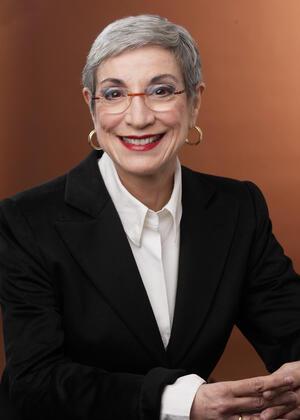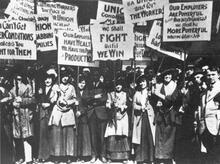Sandra Feldman
Courtesy of New York State United Teachers, NYSUT: A Union of Professionals
Sandra Feldman dedicated her career to protecting the rights of educators as the first woman president of both New York City’s Union Federation of Teachers (UFT) and the American Federation of Teachers (AFT). Feldman began her political involvement in college, where she helped organize the March on Washington. While teaching elementary school in New York, she organized the school’s teaching staff into a new teacher’s union, eventually becoming the first woman president of the UFT. Feldman later became president of the national AFT, where she worked to reduce class sizes, increase teachers’ salaries, and improve preschool programs. Over her career, she also collaborated with UNICEF, The Coalition of Labor Union Women, the New York chapter of the NAACP, and the Jewish Labor Committee.
“Just because kids are poor, and maybe come from uneducated parents, and live in an urban setting, doesn’t mean they shouldn’t have teachers who are paid as well, and whose lives are as comfortable professionally, as teachers from the richest suburbs.” For Sandra Feldman, president of New York City’s United Federation of Teachers from 1986 to 1998, and president of the national American Federation of Teachers from 1997 to 2004, these were fighting words.
Childhood, education, and civil rights
Sandra Feldman’s commitment to the New York City public schools grew out of her own experience. The daughter of Milton and Frances Abramowitz, a milkman and a bakery worker, granddaughter of immigrants from Hungary and Romania, she was born October 14, 1939, and grew up in Coney Island. Her mother was often ill, so Sandra frequently cared for her two younger siblings, Helen and Larry. School was an intellectual and cultural refuge, and she credited Miss Bezman, her second-grade teacher at Public School 188, with expanding her horizons by encouraging her to read.
Feldman graduated from James Madison High School in Brooklyn and, at the age of sixteen entered Brooklyn College, where her political education began when she heard Bayard Rustin, the civil rights activist, who became a mentor, speak about organizing a march to integrate schools. In 1963, when she participated in the March on Washington for Jobs and Freedom, she was arrested for working to integrate restaurants in Maryland. She also participated in organizing efforts for Dr. Martin Luther King Jr.’s March on Washington.
Foray into teaching and the UFT
Feldman earned a master’s degree in English literature from New York University in 1963. She taught first and fourth grades on the Lower East Side of Manhattan and was at first one of only two members of the teachers’ union there, but within a year she helped organize the entire teaching staff. In 1966, on the recommendation of Rustin, she was hired by United Federation of Teachers president Albert Shanker as a full-time field representative. Working her way through the ranks to executive director, she was elected secretary in 1983 and, in 1986, succeeding Shanker, became the first woman president of the union, which was founded in 1960.
Upon Shanker’s death in 1997, Feldman was immediately considered a leading contender to be his successor once again, this time as president of the national American Federation of Teachers, the position he had held since 1974. Her supporters believed her experience in leading a large union, her expertise on political reform, and her innovative success in forming alliances with community and parent groups made her deserving of and qualified for the position; others questioned whether she could successfully serve as president of the UFT and AFT simultaneously (although Shanker had done so from 1974 to 1986); some quarreled with her stand against school vouchers. She was elected AFT president unanimously by the union’s executive council on May 6, 1997. Upon her retirement for health reasons in 2004, the U.S. House of Representatives passed a resolution honoring her for “her outstanding contributions and leadership in improving the quality of teaching and learning.”
Feldman’s legacy: The AFT and beyond
In her position as president of the AFT she pushed for reducing class sizes, for quality preschool programs and for higher teachers salaries. During her tenure, the organization considered ideas that did not always conform to traditional union tenets, including public charter schools and new work rules for teachers designed to raise the academic achievement of low-income pupils. AFT membership grew by some 350,000, during her presidency, topping the one-million mark in 1998.
Her first marriage, to Paul Feldman, ended in divorce. In 1980, she married Arthur Barnes, former president of the New York Urban Coalition, who was the father of two children. Her organizational affiliations reflected a concern for the community. She worked with the United States Committee for UNICEF, the Coalition of Labor Union Women, the Executive Committee of Education International, the New York Chapter of the NAACP, the Women’s Commission for Refugee Women and Children, the Jewish Labor Committee, and many other groups. Her concern for educators, children, women, and labor and a recognition of her Jewish roots were evident in her work and community commitments. She was a powerful and influential voice in the politics of education, in New York City and nationally.
Sandra Feldman died of breast cancer on September 18, 2005.
Davis, Ron. Communication with author.
“New Teachers Leader.” NYTimes, January 10, 1986.
“In Schools’ Crisis, Union’s Opportunity.” NYTimes, September 29, 1995.
“Feldman Ranks High on Federation’s List for Shanker’s Job.” NYTimes, March 30, 1997.
“Feldman Elected Head of National Teachers Union.” NYTimes, May 7, 1997.




